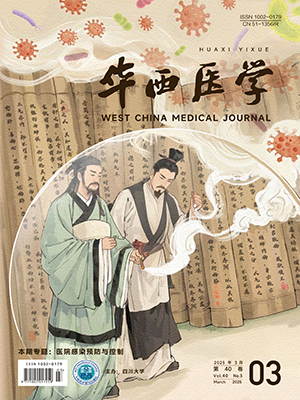| 1. |
Norton C. Constipation in older patients:effects on quality of life[J]. Br J Nurs, 2006, 15(4):188-192.
|
| 2. |
Müller-Lissner SA, Kamm MA, Scarpignato C, et al. Myths and misconceptions about chronic constipation[J]. Am J Gastroenterol, 2005, 100(1):232-242.
|
| 3. |
Kinnunen O. Study of constipation in a geriatric hospital, day hospital, old people's home and at home[J]. Aging (Milano), 1991, 3(2):161-170.
|
| 4. |
张军红, 戎瑞芳. 骨科卧床患者便秘的护理[J]. 河北医药, 2014(18):2879-2880.
|
| 5. |
Wrightb JE. Review of the literature on constipation to enable development of a constipation risk assessment scale[J]. Clin Eff Nurs, 2004, 8(4):192-207.
|
| 6. |
陈映红, 阮丽丽, 黄益珍. 多发性骨折患者便秘原因分析与护理对策[J]. 齐齐哈尔医学院学报, 2015(11):1694-1695.
|
| 7. |
周莲. 骨科卧床患者便秘的护理干预[J]. 中国实用医药, 2013, 8(9):212-213.
|
| 8. |
Lewis SJ, Heaton KW. Stool form scale as a useful guide to intestinal transit time[J]. Scand J Gastroenterol, 1997, 32(9):920-924.
|
| 9. |
Rasmussen LS, Pedersen PU. Constipation and defecation pattern the first 30 days after thoracic surgery[J]. Scand J Caring Sci, 2010, 24(2):244-250.
|
| 10. |
Neighbour C. Improving bowel care after surgery for hip fracture[J]. Nurs Older People, 2014, 26(10):16-22.
|
| 11. |
陈茜, 叶敏. 老年卧床住院患者便秘的影响因素[J]. 中华护理杂志, 2009, 44(9):805-807.
|
| 12. |
阳世伟, 殷磊, 李键. 饮食教育预防骨科术后病人便秘的研究[J]. 中华护理杂志, 2004, 39(1):12-14.
|
| 13. |
Wrightb JE. Review of the literature on constipation to enable development of a constipation risk assessment scale[J].J Orthop Nurs, 2004, 8(4):192-207.
|
| 14. |
Asai T. Constipation:does it increase morbidity and mortality in critically ill patients?[J]. Crit Care Med, 2007, 35(12):2861-2862.
|
| 15. |
Watt-Watson J, Chung F, Chan VW, et al. Pain management following discharge after ambulatory same-day surgery[J]. J Nurs Manag, 2004, 12(3):153-161.
|
| 16. |
Davies EC, Green CF, Mottram DR, et al. The use of opioids and laxatives, and incidence of constipation, in patients requiring neck-of-femur (NOF) surgery:a pilot study[J]. J Clin Pharm Ther, 2008, 33(5):561-566.
|
| 17. |
Probert CJ, Emmett PM, Heaton KW. Intestinal transit time in the population calculated from self made observations of defecation[J]. J Epidemiol Community Health, 1993, 47(4):331-333.
|
| 18. |
Davies GJ, Crowder M, Reid B, et al. Bowel function measurements of individuals with different eating patterns[J]. Gut, 1986, 27(2):164-169.
|
| 19. |
李六亿, 袁建峰, 赵艳春, 等. 医疗综合目标评估对医务人员手卫生依从率的影响[J]. 中国感染控制杂志, 2015(1):16-19.
|




